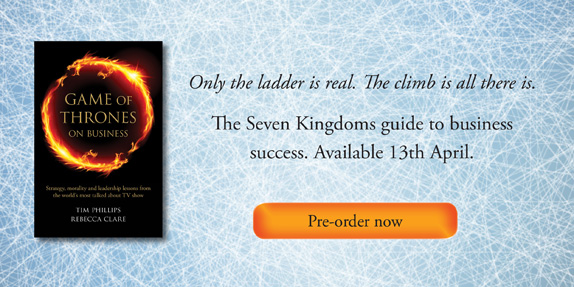Climbing the ladder of chaos – why we all need some Littlefinger in us (ahem)
7 July 2014 by Rebecca in Business and finance, Entertainment, Game of Thrones on Business
Can we control the future? Maybe, says Tim Phillips, a better question is should we even try?
There’s a famous speech, one of my favourite bits, in Game of Thrones in which Petyr Baelish, the amoral political fixer known as Littlefinger, dismisses the historical texts as, “a story we agree to tell each other over and over, until we forget that it’s a lie.” When Lord Varys points out that the alternative is chaos, Littlefinger points out that chaos isn’t something to fear:
 If the inhabitants of the seven kingdoms are fully occupied trying to avoid falling into a pit of chaos, the environment in which they live doesn’t help. When dead people can be reanimated, for example, which must be disorientating. ‘Winter is coming’, we are told at the beginning, which reminds inhabitants of the time when a previous winter lasted a generation. Why did it do that? Maybe it doesn’t matter much if there are undead people coming to kill you as a result.
If the inhabitants of the seven kingdoms are fully occupied trying to avoid falling into a pit of chaos, the environment in which they live doesn’t help. When dead people can be reanimated, for example, which must be disorientating. ‘Winter is coming’, we are told at the beginning, which reminds inhabitants of the time when a previous winter lasted a generation. Why did it do that? Maybe it doesn’t matter much if there are undead people coming to kill you as a result.
So Littlefinger has a point: when things change, old certainties become less valuable, less useful, no matter how comforting they are. Yet the idea that our societies and lives are in equilibrium is alluring for all of us.
We build it into the way we teach business, in which the forces of supply and demand balance to create stable prices and employment and growth. Yet, at the same time, we also know this isn’t really true. The economist Joseph Schumpeter was the first to identify a process he called ‘creative destruction’, in which innovation destroys the old world to create a better one. Real entrepreneurs don’t just tweak existing ideas, they rip them up and start again. If you do this successfully, you get your reward because you are in a field of one: but the risk of disaster is much greater. Schumpeter realised that disequilibrium is normal. We also now know that this applies in society, or to the weather.
It doesn’t even take an entrepreneur to create disequilibrium. In the UK, one in seven workers have been made redundant since the start of the financial crisis, which would have seemed inconceivable a decade ago. The chaotic nature of what economists call ‘the business cycle’ means that we might have a good idea of how secure our jobs will be next month, but no clear answer to the question if we ask about next year, and certainly no idea of the next 10 years.
We instinctively value continuity in our lives and our societies, and many of us react irrationally to disruptive change. In a recent experiment, the Royal Statistical Society took people who overestimated the problems of immigration, and confronted them with well-researched facts that contradicted their ideas. The people overwhelmingly decided that the statistics must be wrong.
We all think we wouldn’t do the same thing in our lives, but most of us react to sudden change by holding on to the stories we tell ourselves, even if they are not true. Not all of us can be a Littlefinger, climbing the ladder out of chaos, or a Schumpeterian entrepreneur, who creates the ladder in the first place.
We spend our lives in the understandable hope that chaos doesn’t come to our homes, families or workplaces. Insurance, savings and sandbags in the shed may help; but to flourish, rather than survive, we need to have a little bit of Littlefinger in us, and recognise that clinging exclusively to ‘the realm, or the gods, or love’ will eventually put us on the receiving end of some process of creative destruction.
Tim Phillips is author of Niccolo Machiavelli’s The Prince, Bertrand Russell’s The Conquest of Happiness, and Charles Mackay’s Extraordinary Popular Delusions and the Madness of Crowds.

